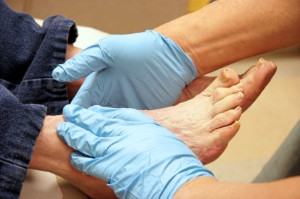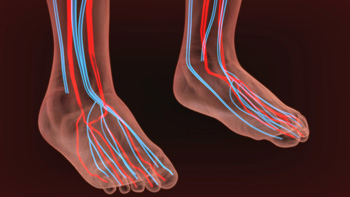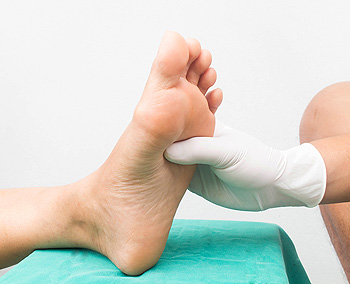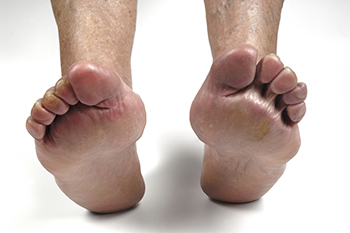Blog
Items filtered by date: July 2025
How Podiatrists Support Diabetics in Foot Protection

People with diabetes face higher risks of foot problems due to poor circulation and nerve damage, which can make small injuries turn serious quickly. Podiatrists play an important role in helping these patients avoid complications. They provide regular foot checks to catch issues early, before they worsen. Care often includes trimming toenails safely, checking skin health, and treating calluses or corns that could lead to wounds. If a foot ulcer or wound develops, a podiatrist can create a treatment plan to promote healing. This may involve cleaning the wound, removing damaged tissue, and using advanced methods like special dressings or negative pressure therapy. Podiatrists also educate patients about proper footwear to prevent injuries and using orthotics for better support. For people with diabetes, foot care is not just a comfort issue, but a critical part of staying healthy. If you have diabetes and notice any changes in your feet, it is suggested you schedule an appointment with a podiatrist who can help you to manage this serious condition.
Diabetic foot care is important in preventing foot ailments such as ulcers. If you are suffering from diabetes or have any other concerns about your feet, contact one of our doctors from Favor Foot Ankle Leg & Wound Center. Our doctors can provide the care you need to keep you pain-free and on your feet.
Diabetic Foot Care
Diabetes affects millions of people every year. The condition can damage blood vessels in many parts of the body, especially the feet. Because of this, taking care of your feet is essential if you have diabetes, and having a podiatrist help monitor your foot health is highly recommended.
The Importance of Caring for Your Feet
- Routinely inspect your feet for bruises or sores.
- Wear socks that fit your feet comfortably.
- Wear comfortable shoes that provide adequate support.
Patients with diabetes should have their doctor monitor their blood levels, as blood sugar levels play such a huge role in diabetic care. Monitoring these levels on a regular basis is highly advised.
It is always best to inform your healthcare professional of any concerns you may have regarding your feet, especially for diabetic patients. Early treatment and routine foot examinations are keys to maintaining proper health, especially because severe complications can arise if proper treatment is not applied.
If you have any questions please feel free to contact our office located in South Amboy, NJ . We offer the newest diagnostic and treatment technologies for all your foot and ankle needs.
Poor Circulation and Your Feet

Poor circulation occurs when blood flow through the vessels is reduced, often due to conditions like diabetes, peripheral artery disease, or prolonged inactivity. When circulation is compromised, the feet may feel cold, numb, or tingly and may develop slow-healing wounds or discoloration. These symptoms can increase the risk of infection and make everyday activities more difficult. A podiatrist can assess blood flow, identify underlying causes, and provide treatments to improve circulation and foot health. This may include lifestyle guidance and wound care tips. If you notice changes in your feet, such as temperature shifts, swelling, or sores that do not heal, it is suggested that you visit a podiatrist promptly who can provide a proper diagnosis and treatment.
While poor circulation itself isn’t a condition; it is a symptom of another underlying health condition you may have. If you have any concerns with poor circulation in your feet contact one of our doctors of Favor Foot Ankle Leg & Wound Center. Our doctors will treat your foot and ankle needs.
Poor Circulation in the Feet
Peripheral artery disease (PAD) can potentially lead to poor circulation in the lower extremities. PAD is a condition that causes the blood vessels and arteries to narrow. In a linked condition called atherosclerosis, the arteries stiffen up due to a buildup of plaque in the arteries and blood vessels. These two conditions can cause a decrease in the amount of blood that flows to your extremities, therefore resulting in pain.
Symptoms
Some of the most common symptoms of poor circulation are:
- Numbness
- Tingling
- Throbbing or stinging pain in limbs
- Pain
- Muscle Cramps
Treatment for poor circulation often depends on the underlying condition that causes it. Methods for treatment may include insulin for diabetes, special exercise programs, surgery for varicose veins, or compression socks for swollen legs.
As always, see a podiatrist as he or she will assist in finding a regimen that suits you. A podiatrist can also prescribe you any needed medication.
If you have any questions, please feel free to contact our office located in South Amboy, NJ . We offer the newest diagnostic and treatment technologies for all your foot care needs.
Symptoms and Risk Factors of Diabetic Neuropathy

Diabetic neuropathy often begins in the feet, where nerve damage can cause numbness, tingling, burning, or sharp pain. Some people lose all feeling in their feet, which can make injuries go unnoticed and lead to serious complications. Neuropathy is more likely to develop in people who have had diabetes for a long time or who have poor blood sugar control. Other risk factors include high blood pressure, excess weight, smoking, and complications in the eyes or kidneys. Because neuropathy in the feet may not cause symptoms right away, many people do not realize there is a problem until an ulcer forms or changes in foot shape occur. Muscle weakness from nerve damage can lead to hammertoes, bunions, or other deformities that increase pressure on the skin. A podiatrist can help by testing for signs of neuropathy, monitoring foot health, and offering treatment to prevent further damage. If you have complications from diabetes that are affecting your feet, it is suggested that you schedule an appointment with a podiatrist for a diagnosis and appropriate treatment.
Neuropathy
Neuropathy can be a potentially serious condition, especially if it is left undiagnosed. If you have any concerns that you may be experiencing nerve loss in your feet, consult with one of our doctors from Favor Foot Ankle Leg & Wound Center. Our doctors will assess your condition and provide you with quality foot and ankle treatment for neuropathy.
What Is Neuropathy?
Neuropathy is a condition that leads to damage to the nerves in the body. Peripheral neuropathy, or neuropathy that affects your peripheral nervous system, usually occurs in the feet. Neuropathy can be triggered by a number of different causes. Such causes include diabetes, infections, cancers, disorders, and toxic substances.
Symptoms of Neuropathy Include:
- Numbness
- Sensation loss
- Prickling and tingling sensations
- Throbbing, freezing, burning pains
- Muscle weakness
Those with diabetes are at serious risk due to being unable to feel an ulcer on their feet. Diabetics usually also suffer from poor blood circulation. This can lead to the wound not healing, infections occurring, and the limb may have to be amputated.
Treatment
To treat neuropathy in the foot, podiatrists will first diagnose the cause of the neuropathy. Figuring out the underlying cause of the neuropathy will allow the podiatrist to prescribe the best treatment, whether it be caused by diabetes, toxic substance exposure, infection, etc. If the nerve has not died, then it’s possible that sensation may be able to return to the foot.
Pain medication may be issued for pain. Electrical nerve stimulation can be used to stimulate nerves. If the neuropathy is caused from pressure on the nerves, then surgery may be necessary.
If you have any questions, please feel free to contact our office located in South Amboy, NJ . We offer the newest diagnostic and treatment technologies for all your foot care needs.
Ingrown Toenails Are More Than Just a Painful Toe

Ingrown toenails occur when the edge of the nail grows into the surrounding skin, causing pain, swelling, and sometimes infection. Common causes include improper trimming like rounding the corners, tight shoes, trauma, or genetic predisposition. While most people know ingrown nails cause pain at the toe’s edge, a lesser-known issue is chronic recurrence, which can lead to thickened skin and nail deformities over time. Symptoms include redness, tenderness, swelling, and sometimes drainage or pus. The area may feel warm and throb with each step, making walking or wearing shoes uncomfortable. Over time, untreated cases can lead to serious infections or skin overgrowth. A podiatrist can diagnose the condition through a simple exam. Treatment ranges from conservative care to partial or full nail removal for persistent cases. Proper nail care education and footwear advice can also help prevent recurrence. If you are dealing with this painful condition, it is suggested that you make an appointment with a podiatrist for evaluation and treatment.
Ingrown toenails may initially present themselves as a minor discomfort, but they may progress into an infection in the skin without proper treatment. For more information about ingrown toenails, contact one of our doctors of Favor Foot Ankle Leg & Wound Center. Our doctors can provide the care you need to keep you pain-free and on your feet.
Ingrown Toenails
Ingrown toenails are caused when the corner or side of a toenail grows into the soft flesh surrounding it. They often result in redness, swelling, pain, and in some cases, infection. This condition typically affects the big toe and may recur if it is not treated properly.
Causes
- Improper toenail trimming
- Genetics
- Improper shoe fitting
- Injury from pedicures or nail picking
- Abnormal gait
- Poor hygiene
You are more likely to develop an ingrown toenail if you are obese, have diabetes, arthritis, or have any fungal infection in your nails. Additionally, people who have foot or toe deformities are at a higher risk of developing an ingrown toenail.
Symptoms
Some symptoms of ingrown toenails are redness, swelling, and pain. In rare cases, there may be a yellowish drainage coming from the nail.
Treatment
Ignoring an ingrown toenail can have serious complications. Infections of the nail border can progress to a deeper soft-tissue infection, which can then turn into a bone infection. You should always speak with your podiatrist if you suspect you have an ingrown toenail, especially if you have diabetes or poor circulation.
If you have any questions, please feel free to contact our office located in South Amboy, NJ . We offer the newest diagnostic and treatment technologies for all your foot care needs.
Ingrown Toenails Are More Than Just a Painful Toe

Ingrown toenails occur when the edge of the nail grows into the surrounding skin, causing pain, swelling, and sometimes infection. Common causes include improper trimming like rounding the corners, tight shoes, trauma, or genetic predisposition. While most people know ingrown nails cause pain at the toe’s edge, a lesser-known issue is chronic recurrence, which can lead to thickened skin and nail deformities over time. Symptoms include redness, tenderness, swelling, and sometimes drainage or pus. The area may feel warm and throb with each step, making walking or wearing shoes uncomfortable. Over time, untreated cases can lead to serious infections or skin overgrowth. A podiatrist can diagnose the condition through a simple exam. Treatment ranges from conservative care to partial or full nail removal for persistent cases. Proper nail care education and footwear advice can also help prevent recurrence. If you are dealing with this painful condition, it is suggested that you make an appointment with a podiatrist for evaluation and treatment.
Ingrown toenails may initially present themselves as a minor discomfort, but they may progress into an infection in the skin without proper treatment. For more information about ingrown toenails, contact one of our doctors of Favor Foot Ankle Leg & Wound Center. Our doctors can provide the care you need to keep you pain-free and on your feet.
Ingrown Toenails
Ingrown toenails are caused when the corner or side of a toenail grows into the soft flesh surrounding it. They often result in redness, swelling, pain, and in some cases, infection. This condition typically affects the big toe and may recur if it is not treated properly.
Causes
- Improper toenail trimming
- Genetics
- Improper shoe fitting
- Injury from pedicures or nail picking
- Abnormal gait
- Poor hygiene
You are more likely to develop an ingrown toenail if you are obese, have diabetes, arthritis, or have any fungal infection in your nails. Additionally, people who have foot or toe deformities are at a higher risk of developing an ingrown toenail.
Symptoms
Some symptoms of ingrown toenails are redness, swelling, and pain. In rare cases, there may be a yellowish drainage coming from the nail.
Treatment
Ignoring an ingrown toenail can have serious complications. Infections of the nail border can progress to a deeper soft-tissue infection, which can then turn into a bone infection. You should always speak with your podiatrist if you suspect you have an ingrown toenail, especially if you have diabetes or poor circulation.
If you have any questions, please feel free to contact our office located in South Amboy, NJ . We offer the newest diagnostic and treatment technologies for all your foot care needs.
Are Bunions Affecting Your Everyday Life?
Lifestyle Choices and Their Effect on Rheumatoid Arthritis in the Feet

Rheumatoid arthritis is an inflammatory condition that often targets the small joints in the feet and ankles. Certain lifestyle habits may influence both the development and progression of the disease. Smoking is linked to increased joint damage and may reduce the effectiveness of medication. Excess body weight adds pressure to the joints, increasing pain and limiting mobility. Staying active with low-impact exercise can help preserve range of motion and improve strength without adding stress. Wearing supportive footwear and cushioned insoles may ease discomfort during daily movement. Attention to stress levels, nutrition, and rest also plays a role in managing symptoms and maintaining joint health. If you are noticing pain, stiffness, or swelling in your feet and ankles, it is suggested that you schedule an appointment with a podiatrist for additional relief options.
Because RA affects more than just your joints, including the joints in your feet and ankles, it is important to seek early diagnosis from your podiatrist if you feel like the pain in your feet might be caused by RA. For more information, contact one of our doctors of Favor Foot Ankle Leg & Wound Center. Our doctors will assist you with all of your podiatric concerns.
What Is Rheumatoid Arthritis?
Rheumatoid Arthritis (RA) is an autoimmune disorder in which the body’s own immune system attacks the membranes surrounding the joints. Inflammation of the lining and eventually the destruction of the joint’s cartilage and bone occur, causing severe pain and immobility.
Rheumatoid Arthritis of the Feet
Although RA usually attacks multiple bones and joints throughout the entire body, almost 90 percent of cases result in pain in the foot or ankle area.
Symptoms
- Swelling and pain in the feet
- Stiffness in the feet
- Pain on the ball or sole of feet
- Joint shift and deformation
Diagnosis
Quick diagnosis of RA in the feet is important so that the podiatrist can treat the area effectively. Your doctor will ask you about your medical history, occupation, and lifestyle to determine the origin of the condition. Rheumatoid Factor tests help to determine if someone is affected by the disease.
If you have any questions please feel free to contact our office located in South Amboy, NJ . We offer the newest diagnostic and treatment technologies for all your foot and ankle needs.
Blog Archives
- August 2025
- July 2025
- June 2025
- May 2025
- April 2025
- March 2025
- February 2025
- January 2025
- December 2024
- November 2024
- October 2024
- September 2024
- August 2024
- July 2024
- June 2024
- May 2024
- April 2024
- March 2024
- February 2024
- January 2024
- December 2023
- November 2023
- October 2023
- September 2023
- August 2023
- July 2023
- June 2023
- May 2023
- April 2023
- March 2023
- February 2023
- January 2023
- December 2022
- November 2022
- October 2022
- September 2022
- August 2022
- July 2022
- June 2022
- May 2022
- April 2022
- March 2022
- February 2022
- January 2022
- December 2021
- November 2021
- October 2021
- September 2021
- August 2021
- July 2021
- June 2021
- May 2021
- April 2021
- March 2021
- February 2021

